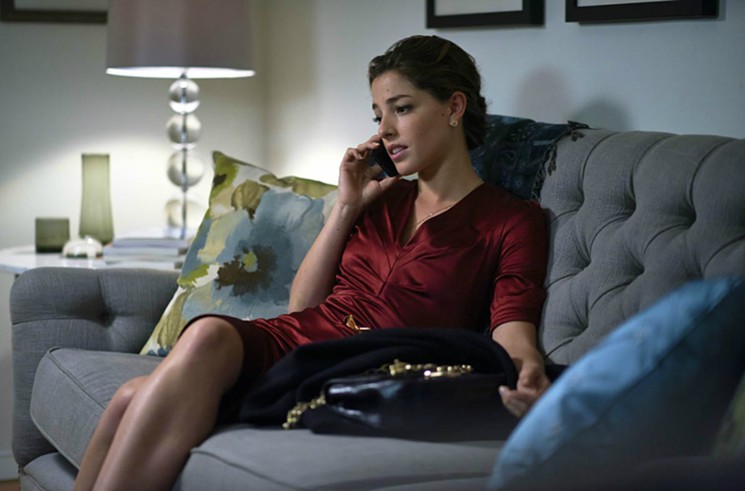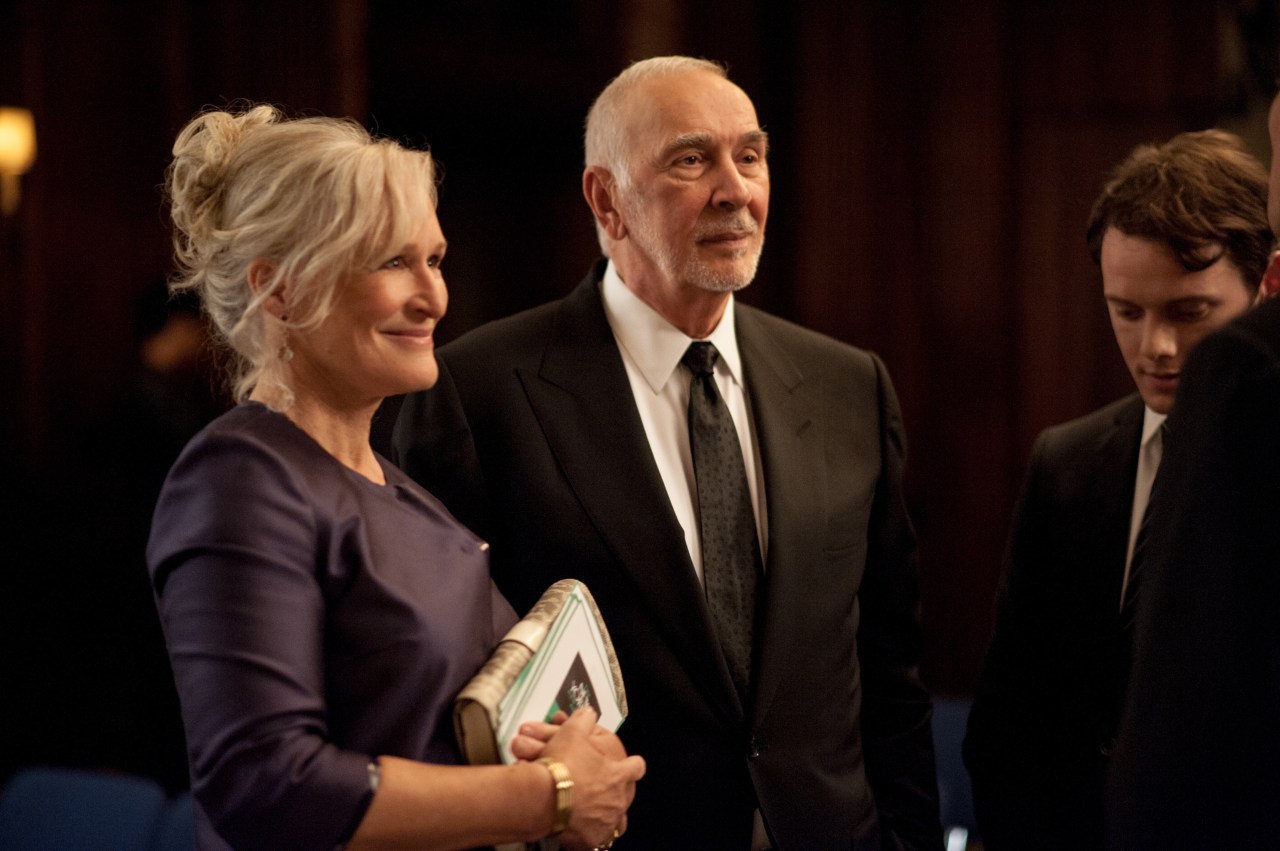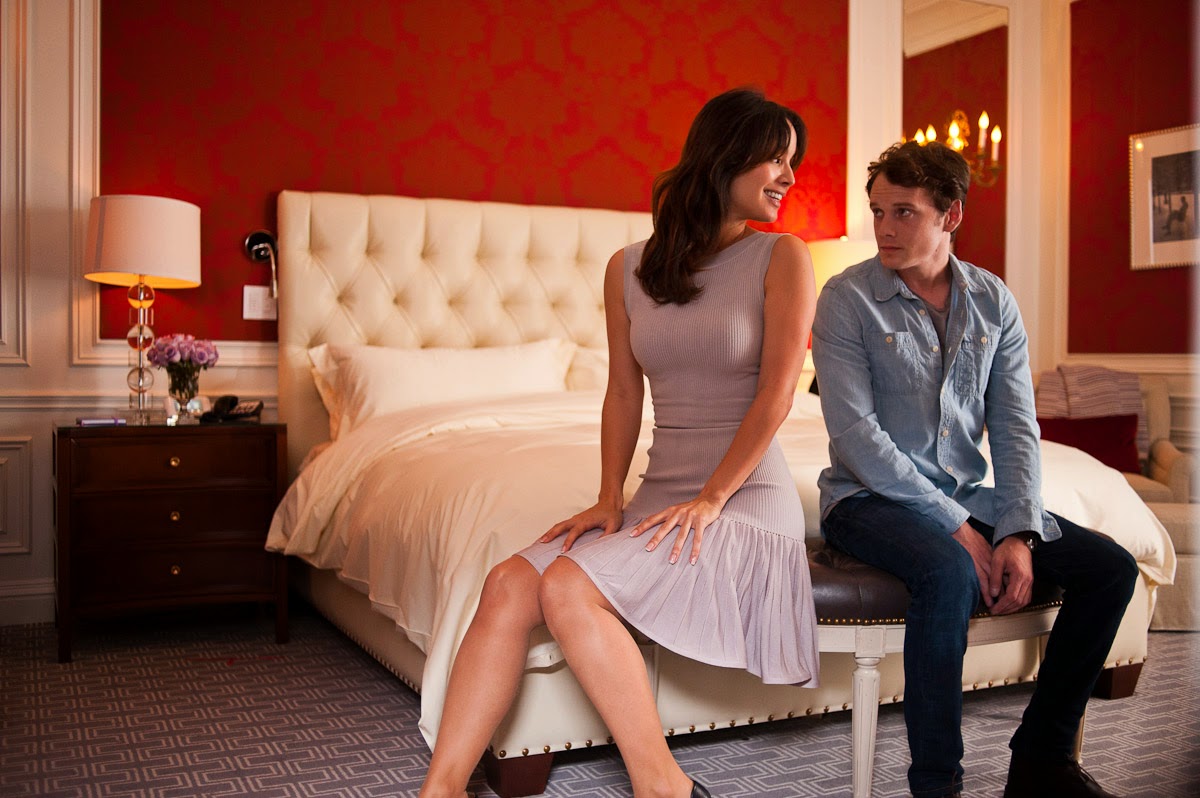Last year, one of my favorite films to premiere at the Tribeca Film Festival was Victor Levin’s 5 to 7. The TV writer/producer (The Larry Sanders Show, Mad About You) has been writing films since 2004, but his directing debut is one to behold. Not only is it a beautiful movie, but the unconventional love story is as romantic as it is heartfelt.
Skyfall’s Bérénice Marlohe plays Arielle, the wife of a diplomat, who falls in love with a 20-something writer named Brian (Anton Yelchin). But it isn’t about an elicit, secret affair, because Arielle is an a completely consensual and honest open marriage with her loving husband Valery (Lambert Wilson), who has his own girlfriend, Jane (Olivia Thirlby). Levin’s open, honest, and non-judgmental look at modern love, marriage, and relationships is something to behold, and we spoke about bringing the story to life – almost 30 years after his initial inspiration
Lesley Coffin (TMS): Although the film is set in the modern day, the movie has classical elements in its tone and form. What was the inspiration for the film, both thematically and cinematically?
Victor Levin: To take the first part of the question, the inspiration story-wise started in 1987 when I traveled to Paris with my girlfriend at the time, and we stayed at the home of a couple who were older and married, and had this kind of [open] marriage. It was just how they lived. And it was around holiday times, and they were having a large gathering and the boyfriend and girlfriend were both there. And I remember taking my girlfriend aside and saying, what is going on? And she explained to me how it worked.
Now, I am a middle-class kid from the New York suburbs and this was far from any of my experiences; but my girlfriend told me to keep my mouth shut and my eyes open, and maybe I’d learn something. And she was right. I watched and I listened and saw them being respectful and elegant about it. There were, as we say in the movies, strict rules and codes of conduct which were involute, and it worked for them. Now, I’m not advocating it, to each [their] own. But I filed it away and waited for it to work itself out. Life doesn’t come in a three act structure, you have to puzzle with it for a while.
It was important that this movie not have a point of view as to whether this was a good or bad system. It was important not to compare some sort of European ethos to an American ethos. I’m not really interested in that. One happens to be French, and one happens to be an American, but what I was interested in was the strength of love, and what we do for love, and what happens to love when it is tested or faced with significant obstacles. And in terms of cinematic inspiration, there are many that are right at the heart of me as a film viewer. Certainly at the forefront is the work of François Truffaut whose film Jules and Jim is excerpted in this film – at no small price, by the way. But it was important to use that film because I do believe that Jules and Jim is the grandfather of all modern romances.

TMS: And it’s another very open-minded film about unconventional love stories.
Levin: Exactly right, that’s what I love about it. People are, in a funny way, very matter-of-fact about it. And of course, that chilling last line, “He wanted to comingle the ashes, but it was not permitted.” That is the kind of smart and unflowery discussions about love which is really the most convincing for me. And I’m inspired by other Truffaut films of course, and the great Lina Wertmuller, especially the original Swept Away, and have carried that around in my soul since the first time I saw it. And a lot of other European works, which have a certain truth. They make you laugh and cry, but come by it honestly. And when you sit down to write, they’re all in there swirling around. But there are also a lot of American movies and English speaking directors I love. Woody Allen and Bill Forsyth, who made the wonderful movie Local Hero. And Whit Stillman who made one of my favorite films, Metropolitan. But key is to not be artificial in the storytelling or the filmmaking. That’s true of all those filmmakers and what I strive for as filmmaker. And I just hope it’s true of my own work.
TMS: The characters do have an age difference which is addressed, but isn’t dwelled on as something to stress about or overcome. Was it important that Olivia and Anton’s characters be younger than Bérénice and Lambert’s?
Levin: It was important for a number of reasons. For one thing, [Arielle] has to have children. I supposed she could have had children as a very young woman, but that didn’t feel right. The children are a big part of the story because it’s the reason it ends the way it ends. So that was one of the reasons she had to be older. And also, she had to have a bit more wisdom than he does, and have the ability to see this event in the context of a longer life. It just felt right for one half of the major relationship being a little wiser than the other.

TMS: Olivia Thirlby’s character in this was really interesting to me because, of all the characters, she is in some ways the most pragmatic about this situation, knowing this will likely only be a temporary situation and being okay with that. We don’t often see women of her age playing characters who see love that way. What role does she play in the film as the confidant to Anton and Lambert’s girlfriend?
Levin: Well, first of all, Olivia’s character Jane is there to first articulate this idea that he shouldn’t worry so much. Take every day as it comes, enjoy what comes, life is difficult enough. Because Brian is a natural worrier, so someone has to be there to tell him, this is a great gift, just smile and be happy. And I wanted to give the audience a less problematic potential relationship from Brian. I want the audience to think for a second, “Why doesn’t he just have a relationship with her, it would be so much easier.” She’s beautiful, she’s brilliant, they like each other, they are around the same age, they come from the same culture, and there would be no broken rules. It would all be so much simpler.
But the point is, it’s not simple and love is not simple. Love is messy, and life is messy. And when we fall in love and its messy, you have to figure it out. She needed to be there to serve that purpose, she needed to be there to articulate those ideas, and she needed to be there to become that lifelong friend that he desperately needs. Also, frankly, I enjoyed not bringing them together, and if audiences think they will end up together, I enjoy stressing that there are other ways to tell love stories.
TMS: We have seen a lot of movies recently which would be described as “romances” which, even if they are attempting to be “sexy,” do not have a very positive image of sex, and take a very conservative, moralistic stance on sex outside of marriage. Have you received any backlash about the film’s morality?
Levin: In all the screenings I have had of the film, the love between the characters is so apparent on screen, that the love-making seems very natural to the audiences. And I think I can say they enjoy watching them, seeing it take place and knowing it is mutually fulfilling for the characters. That’s been my read of audiences at screenings and based on what they ask during Q&As. The movie takes enough time exploring the morality of the situation before it throws in the sex that you can move beyond that and enjoy their sex life as if they had no other ties. I believe the most important thing about a romance is that you are rooting for the couple to ultimately be happy, and that you enjoy watching them meet and be together. So if the movie overcomes an obstacle by dealing with things honestly, you are free to enjoy them the way you would any other couple. And that is the sense I get from audiences.

TMS: When it came to casting the movie, did you change anything based who was cast, such as age or their nationality?
Levin: No, I didn’t alter the writing for any particular actor. The voices are what they’ve always been. I’m sure there have been lots of lines of dialogue tailored to one actor’s particular rhythms. There are some actors whose rhythms are just funnier with certain lines of dialogue. And on a dialogue level, on a line by line level, you are trying to make conversations fit every actor. But you do change some things around, but for the most part dialogue and characters stayed the same. And I had wonderful partners with these actors. They are creative partners, and you have to work through the text with them to make sure they can get through it and are believable when they say it, and feel what the characters feel. It is absolutely a shared endeavor.
TMS: The music is so beautiful and kind of unexpected for a contemporary romance. How did you select it, and what made you choose score over popular songs?
Levin: We looked and listened to everything. For a while, we talked about jazz, and rock and roll, and blues. When you are editing and creating a rough cut, that’s when you try everything and see if it’s going to work. And until you have that scene with that song, you’ll never know what will or won’t work. And it is really quite surprising how different things will be, but between myself and my editor Matt Maddox and my producers, we knew that classical music and a beautiful melody would work best.
There are actually two melodies which appear throughout the film; one a waltz, one a bit more classical. And we were fortunately enough working with our composers Daniel Bensi and Saunder Jurriaans, who had done Martha Marcy May Marlene, which is a very different score, but they had a great demo reel and my producer Julie Lynn just loved them and she has great creative instincts. But they didn’t have much classical music on there, so we met and I asked, “How would you like to try classical? I have a feeling you’ll be great for this.” And my producer Julie Lynn just loved them and she has great creative instincts, so she really advocated for them. And they just blossomed into these great classical composers and musicians, and were also incredibly patient with me, working with me over a lot of late nights to get it just right. I think these guys are just massive talents and have gone on to work a lot since, not to say it’s because of this movie, but I was glad to see them getting more opportunities.
TMS: And it works beautifully because the score just moves the story along emotionally without being noticeable the first time you watch the movie.
Levin: It’s funny with music, because most of the time you want it to work on a subconscious level, but you also want it to be beautiful. And I think that is true of all the disciples of moviemaking. You don’t want anyone to be saying, oh, isn’t that beautiful, you just want them to be thinking it on a subconscious level while being absorbed in the story. And it can be a tricky balance.
5 to 7 is out now in theaters and on IFC VOD.
Lesley Coffin is a New York transplant from the midwest. She is the New York-based writer/podcast editor for Filmoria and film contributor at The Interrobang. When not doing that, she’s writing books on classic Hollywood, including Lew Ayres: Hollywood’s Conscientious Objector and her new book Hitchcock’s Stars: Alfred Hitchcock and the Hollywood Studio System.
Are you following The Mary Sue on Twitter, Facebook, Tumblr, Pinterest, & Google +?








